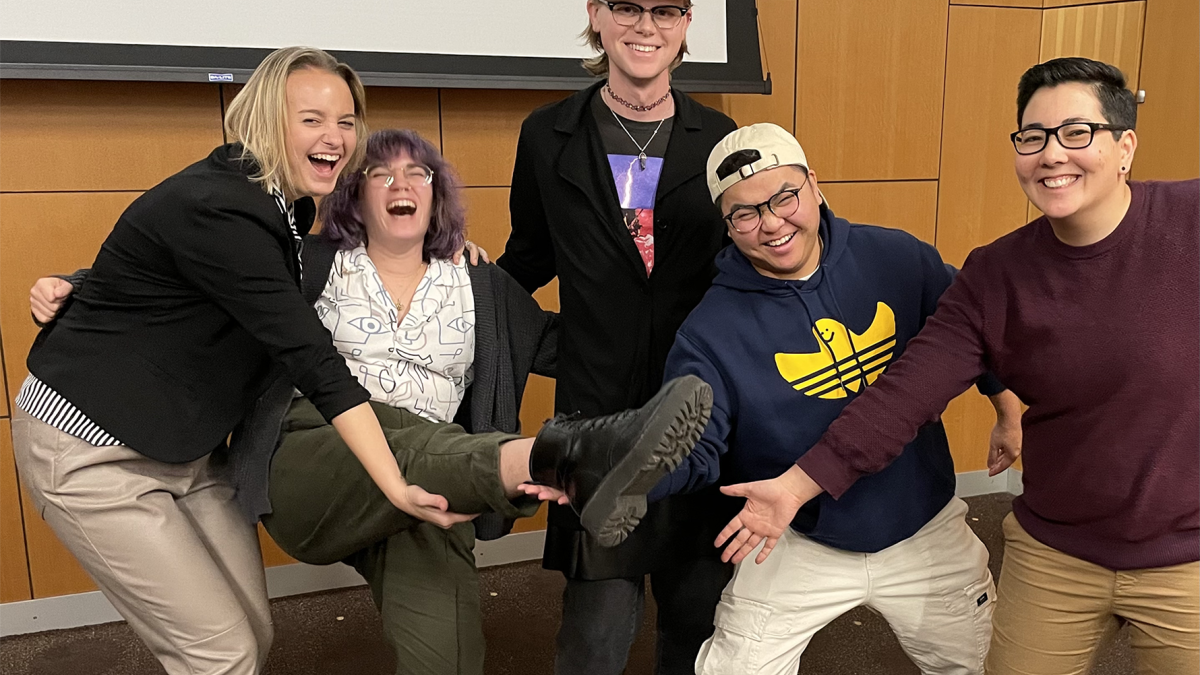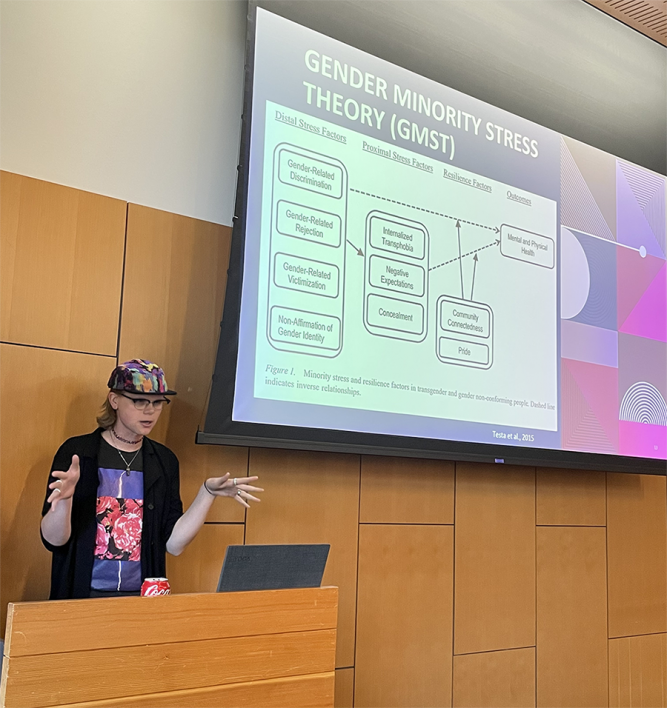Research awards bookend spectacular year for ASU counseling professor

Professor Em Matsuno (far right) poses with Empowerment Lab team members Brooke Hoeferle, Alex Colson, Danny Shultz and Finneas Wong at the workshop they coordinated in April for ASU trans and nonbinary students. Hoeferle has completed the Master of Counseling degree. Colson, Shultz and Wong are in the doctoral program in counseling psychology. Photo courtesy Em Matsuno
The past school year has been filled to the brim with awards for ASU Professor Em Matsuno.
Matsuno, a second-year assistant professor of counseling and counseling psychology, was recognized this spring by the College of Integrative Sciences and Arts with the Outstanding Faculty Research Award for an early-stage scholar.
This caps off a year that also saw Matsuno win a coveted $2.2 million R01 grant from the National Institutes of Health, as well as a $46,000 seed grant from the Institute for Mental Health Research, to conduct a pilot study in collaboration with the Phoenix Children’s Hospital gender support program.
School of Counseling and Counseling Psychology Director Ayşe Çiftçi and colleague Frank Dillon both shared letters of support for Matsuno’s nomination for the college honor.
“Dr. Matsuno is one of the most impressive early-career colleagues that I have witnessed with in over 15 years as a faculty member, due to their innovative, significant, and prolific research,” wrote Dillon, professor of counseling psychology, noting that Matsuno has already published 35 peer-reviewed journal articles, book chapters and reports. “Their scholarship has and will continue to make a difference in the lives of gender minorities who are greatly under-studied and who face significant health disparities, such as heightened risk for depression, anxiety, substance use and other health outcomes.”
Studying gender-based disparities
Matsuno is a principal investigator on the R01 grant project to better understand the role of resilience in addressing mental health disparities for transgender and gender-diverse individuals. It is funded under NIH’s National Institute on Minority Health and Health Disparities.
Matsuno, who uses they/them pronouns, described their reaction to the news: “The feeling was definitely shock and disbelief, but also so much excitement and joy. This was followed by some jumping around and cheering with my wife, who baked me a cake the next day to celebrate!
“It’s the best thing to happen in my career so far,” Matsuno added.
Earning an NIH R01 grant is definitely cause for jubilation — and cake! Photo courtesy Em Matsuno
Only about 20% of R01 grant applications are funded, according to the NIH website. As a result, the average age of a first-time principal investigator is 44, noted Matsuno, who is more than a decade younger. Investigators may also apply to extend R01 grants, to scale up or expand the work, and the applicant success rate for those awards is about 40%.
“These R-series awards are often ladders to build a highly successful and impactful research portfolio,” Matsuno said.
“Achieving these kinds of funding milestones and this momentum as a second-year assistant professor is a spectacular accomplishment,” said Joanna Grabski, dean of the College of Integrative Sciences and Arts. “Em’s research trajectory is very impressive. Their research has the potential to make a significant impact on public health and improve the mental health and wellbeing for transgender and gender-diverse people.
“Dr. Matsuno is also adding to our college’s recognition as the home to one of the top counseling and counseling psychology programs in the country.”
What does the community need?
ASU’s charter emphasizes inclusion and “assuming fundamental responsibility for the economic, social, cultural and overall health of the communities it serves.” These, too, are driving forces for Matsuno.
“Centering research on what the community needs to make positive change, that’s the broad hope for my research,” Matsuno said.
That’s certainly at the heart of Matsuno’s work on the Parent Support Program at Phoenix Children’s Hospital. The project will assess the effectiveness and implementation of the online intervention for parents of transgender and nonbinary youth that Matsuno developed and pilot-tested for their doctoral dissertation.
“I never would have predicted I’d still be involved in setting up and evaluating programs for parents of trans youth,” said Matsuno, who spent several years developing training modules and running focus groups to develop and test an online intervention for parents of trans youth as a doctoral student at University of California, Santa Barbara.
“But this is where the data has led. The research pointed to how pressing the need is for parental support … and so I’ve followed where the data showed support could be most impactful.”
The intervention content focuses on helping parents process and get through their own emotions, gain knowledge about trans identities, and learn skills-based tools on using affirming language, coming out, advocating and on making medical decisions.
The community needs behind the complex NIH-funded research project on resilience are numerous and multidimensional.
Matsuno and their co-PIs discovered, in reviewing a decade of resilience research published between 2010–20, an enormous disconnect when they compared quantitative and qualitative research on transgender and gender diverse populations.
“There’s so much that trans people are saying in the qualitative research that has been overlooked in quantitative research on (transgender and gender diverse) people’s experiences of resilience,” Matsuno said.
For example, studies may have asked people to react to nondescript, individual-centric statements like: “I can bounce back quickly from hardships” or “It does not take me long to recover from a stressful event.”
“But these measures of resilience don’t take into account the specific ways that trans people resist and are resilient to the types of oppression they face,” Matsuno explained, “and they don’t address the role of community in resilience.”
So the team is considering statements for their new measure of trans-specific resilience that draw on the richness of experience that has already been acknowledged in qualitative studies, like: “Having people in my life who accept my gender helps me heal more quickly” or “Rejecting societal expectations about gender, when they don’t fit for me, has been liberating.”
Another strength of project is its emphasis on integrating feedback from the community.
“Participants become co-researchers in our community participatory method,” Matsuno said, “and we’ll be using an advisory board of trans and nonbinary community members to solicit feedback throughout the study.”
Counseling psychology doctoral student Danny Shultz explains the foundations of gender minority stress theory to participants in the Empowerment Lab’s spring workshop “Understanding and Coping with Gender Minority Stress.” Photo courtesy Em Matsuno
A welcoming space
Counseling psychology graduate student Alex Colson, who uses they/them pronouns and just completed the second year in their doctoral program, said they appreciate the holistic mentoring they have found in working with Matsuno.
"Dr. Em Matsuno and the Empowerment Lab have significantly contributed to my growth as a critical, socially-just counseling psychologist and scholar. Their mentorship has nourished my growth personally and professionally as I learn from their intentional and loving teaching, research, and advocacy,” Colson said. “I will forever be grateful for their presence in my life."
Matsuno acknowledges the impact their own mentors have had on their career and personal development.
“I grew up in Laramie, Wyoming; there is not a big queer population there and I dealt with a lot of internalized struggles. Going on to graduate school as a queer person and being able to do work that incorporated my lived experience was super rewarding for me,” they said about working with ASU alum Tania Israel, Matsuno’s doctoral advisor at UC Santa Barbara.
What directions does Matsuno think their future research will take?
“I see myself continuing to do work that promotes the wellbeing of (transgender and nonbinary) people, and looking at the least-researched subpopulations such as transgender and nonbinary people of color.”
More Science and technology

ASU-led space telescope is ready to fly
The Star Planet Activity Research CubeSat, or SPARCS, a small space telescope that will monitor the flares and sunspot activity…

ASU at the heart of the state's revitalized microelectronics industry
A stronger local economy, more reliable technology, and a future where our computers and devices do the impossible: that’s the…

Breakthrough copper alloy achieves unprecedented high-temperature performance
A team of researchers from Arizona State University, the U.S. Army Research Laboratory, Lehigh University and Louisiana State…



